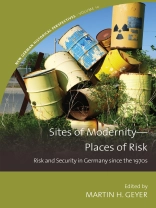“Places of risk” and “sites of modernity” refer not merely to physical locations, but also objects and institutions that stand at the center of contemporary debates on security and risk. These are social and political domains where energy and infrastructure are produced, where domestic security is pursued and maintained, and where citizens encounter the state in its punitive or monitory roles. Taking a wide view of the period from the 1970s to today, this volume brings together innovative, interdisciplinary case studies of sites of modernity that promise to provide security and safety, yet at the same time are deemed responsible for creating new risks. With a particular contemporary interest in the technocratic changes of security and risk control the contributors to Sites of Modernity — Places of Risk position the 1970s as a turning point in the path from industrial to post-industrial modernity.
Зміст
List of Tables
Introduction
Martin H. Geyer
Chapter 1. Exploring the Invention of Risk Debates: Natural Disasters, Insuranceand Risk Management in the Late Twentieth Century
Nicolai Hannig
Chapter 2. Insuring Catastrophes: Capital Market-Based Forms of Insurance since the 1980s
Martin Lengwiler
Chapter 3. Places of Risk on the Site of Socialist Modernity: Fighting Industrial Accidents until the GDR Was No More
Thomas Lindenberger
Chapter 4. From “Black Sheriffs” to “Security Partners”? The Emergence of Private Policing in Public Spaces in Germany since the 1970s
Marcus Böick
Chapter 5. Risky Housing: Squatting in London and Hamburg in the 1970s and Early 1980s
Christine G. Krüger
Chapter 6. Imprisoned Protest: The Body at Risk and Hunger Strikes in the United States in Transnational Perspective, 1968‒1985
Maximilian Buschmann
Chapter 7. “An Inseparable Pair”: Freedom and Security in the Schengen Space
Isaac Stanley-Becker
Chapter 8. It’s the Brain, Stupid: Neuroscience, Risk, and Crime
Peter Becker
Conclusion: From Risks to Emergencies?
Martin H. Geyer
Про автора
Martin H. Geyer has been Professor for Modern History at the Ludwig Maximilians University Munich since 1997.His research interests and publications deal with issues of social policies, political scandals, the history of capitalism and political and social theories in the 1970s and 1980s. His recent publications include Kapitalismus und politische Moral in der Zwischenkreigszeit Oder: Wer war Julius Barmat? (Hamburg 2018); and his is currently working on a research project which is entitled The State of Emergency in the 20th Century: What We Can Learn Today from German History of the Interwar Period.












